- Home
- Donis Casey
The Old Buzzard Had It Coming Page 3
The Old Buzzard Had It Coming Read online
Page 3
Dinner on wash day always consisted of leftovers from Sunday dinner, since cooking from scratch was out of the question on such a busy day. Alafair had just built up the fire in the stove when Shaw got home. It had taken him almost half the day to deposit all the kids where they needed to go and to take care of some business at Mr. J.W. Brown’s hardware store. The trip into Boynton only took twenty minutes in good weather, but a buckboard loaded with people took twice that long when it had to slog through the mud. His first stop had been to deposit the kids at Boynton Public School, including the twins, who along with two boys comprised the entire senior class. Mary had graduated high school in the spring, and now was helping Miss Trompler, the first-though-third grade teacher, while she decided if she wanted to be a teacher herself. Her parents had offered to send her to the teacher’s seminary in Tahlequah, since she could get her education and live with Alafair’s brother Robert’s family there. And Alafair and Shaw were great proponents of education, for the girls as well as the boys.
It was the same when Martha had decided that she wanted to learn the rare and coveted skill of typewriting, because, she told her mother, she could always support herself and would never be totally dependent. Shaw had taken her to enroll in a six month business course in Tulsa, where she could, after all, get her education and live with Shaw’s aunt Suley and her husband. Martha had come back armed with myriad sophisticated skills and immediately gotten a well-paying position as secretary to Mr. Lucas Bushyhead, president of the First National Bank of Boynton. The grandparents were scandalized.
After leaving Martha at the bank and doing his business with Mr. Brown, Shaw headed for home. He had already put in several hours’ work with the animals before he had taken the kids to town, and Alafair knew that when he finally got into the house after unhitching the team, parking the wagon, and feeding the horses, he was going to be ravenous.
Alafair was standing at the kitchen window, tying her apron behind her back and watching Shaw drive toward the barn, when she caught sight of Sheriff Scott Tucker come riding up the drive on his tall roan mare.
She turned and walked through the parlor and out onto the front porch just as Scott reined at the gate. Alafair walked down the steps, clutching her sweater to her, and Scott removed his hat as she neared.
“Howdy, Alafair,” he greeted cheerfully. “Finally warming up, ain’t it?”
“I reckon,” she responded. “I was glad it’s warm enough to do a wash without the clothes freezing on the line. We’ll be sitting down to dinner in half an hour or so. Come on in and join us. Have some coffee, gab with Shaw a spell.”
Scott looked toward Shaw, who had almost reached the barn with the buckboard before he had seen the sheriff ride in. He had just begun to turn the wagon around and head back toward the house. “Sorry, Alafair,” Scott said regretfully. “Can’t do it. Just come to see if Shaw will help me in a bit of a chore. I’m on my way to the Day place.” Scott Tucker was Shaw’s cousin, owner of the Boynton Mercantile Company and the six room American Hotel above it, both of which were run by his wife. Scott was far too busy being sheriff to give much of his time to his businesses.
“What brings you hereabouts?”
“The oldest Day boy just rode in on that lop-eared mule of theirs to tell me that they found Harley Day froze to death out in the yard.”
Alafair straightened. “Well, I’ll be,” she managed. “Froze, you say.”
Scott, a shorter, rounder, and even jollier version of Shaw, laughed, seemingly unconcerned about the seriousness of the situation. “Yes, indeed,” he assured her. “Apparently he wandered off from the house drunk on Wednesday night, and they thought he was just off on one of his benders. Turns out he lay down next to the house on the north side to take a little nap and promptly froze to death. Just this morning the drift melted enough for them to figure out where he’d gone.”
Alafair contemplated this for a moment. “Where is John Lee?” she finally asked.
“He told me that he was going to tell his daddy’s sister and brother-in-law, who live north of town, see if they’ll take the kids for a spell.”
Alafair nodded. “The ways of the Lord are strange,” she observed.
Scott shrugged. “I don’t imagine that the family will be overly broke up about the old reprobate’s passing.”
Unwilling to speak ill of the dead, Alafair didn’t respond, but she thought Scott was probably right. More than likely it would be a great relief to Mrs. Day not to have that horrifying presence around herself or her children any more. But losing one’s husband, even such a poor specimen as Harley Day, presented another whole set of problems. Especially if one were without resources, either financial or emotional.
Shaw pulled up in front, and Scott maneuvered his horse around to the side of the wagon. “What brings you out this way on such a sloppy day?” Shaw asked.
Alafair leaned up against the gate and rubbed her hands together to warm them. “Old Harley Day has died,” she informed him.
Shaw looked at Scott for confirmation, his eyebrows rising. “Is that so?” he asked.
“It is so,” Scott told him. “I’m going over there right now, and I figure I’m going to need some help moving the body after I see what’s what.”
“Did he get killed or what happened?”
“His boy says they think he died of the cold when he fell down drunk outside the house.”
The corner of Shaw’s mouth twisted up in his characteristic smirk. “Well, go along, then, and I’ll follow you in the wagon directly.”
“I’ll come with you,” Alafair interjected, and both men looked over at her. “Miz Day will be needing some help laying out the body,” she explained, heading for the house to get her coat and wool scarf.
Scott plopped his hat back onto his balding head. “Y’all come along as soon as you can,” he called, already cantering toward the road.
Shaw sat chaffing his hands and stomping his feet for ten minutes, calling to his hounds, who kept leaping in and out of the back of the wagon, before Alafair reappeared, bundled to the eyes and carrying a tin pail and a towel-wrapped tin jug that Shaw fervently hoped contained hot coffee.
He relieved her of the food and she climbed up onto the seat next to him. He snapped the reins and called to the team of mules, and they began to move as Alafair dug into her tin pail and brought out a couple of pieces of cold fried chicken. “There was a little chicken left over from yesterday, and I whipped up a couple of bean sandwiches with onion. It ain’t much, but it’ll tide us over.”
“I’ll sure have some,” Shaw told her, “and pour me some of that coffee before my insides freeze solid.”
Alafair pulled a mug out of the bucket and maneuvered the lid off of the jug with her mittened hands. “I’ll swear, I haven’t had one thought about the Days in a year, and all of a sudden they’re all over the place.”
“They’re not the type of folks that one really gets friendly with,” Shaw said, between bites, “though it is odd that we never saw them kids any more than we did.”
“I think that father of theirs kept all of them on a pretty short leash.”
There was a pause in the conversation when they reached the road. Alafair climbed down from her perch and swung the heavy wood and wire gate closed after Shaw drove out. He pulled up in the road and waited while she dropped a piece of looped wire over the end of the gate and the terminal fence post, then hauled herself back up next to him. “I’ll tell you what I think is odd,” Shaw said, as though they had never interrupted the conversation. “For somebody that’s as much of a friend of the downtrodden as you are, I’m surprised you ain’t Miz Day’s best friend and protector.”
Alafair knew he was twitting her a little bit, but she bristled just the same. “I tried to make friends with that woman dozens of times over the years, as you very well know, but she was having none of it.”
“Yes, I very well know,” Shaw admitted, amused. “Now that that skunk of a husband of hers has g
one on to his reward, such as it may be, she might be more willing to be neighborly.”
Alafair shrugged. “Truth is, I always got the feeling that she’s more ashamed than unfriendly. No money, bunch of raggedy kids, an occasional black eye, if I read that situation right. I’d have helped her, if she’d have let me, but I couldn’t very well force myself on her.”
“No, that would have shamed her,” Shaw agreed.
“You expect that they’ll be able to stay on?” Alafair wondered anxiously. “I’m thinking the bank might foreclose on them.”
“That’s a possibility,” Shaw admitted. “Though they won’t if there’s a brain to be had amongst them bank officers.” He flicked a glance at his wife. “Which I wouldn’t bet money on,” he added. “But the truth is, it’s John Lee that does all the work on that farm, along with help from all his little brothers and sisters, at least from what I’ve been able to see.”
“Scott said the same thing.”
“Problem is the boy is underage, and it wouldn’t be him that holds the note on the farm. So my guess is that they’ll be having to pack up and leave.”
“That’s a shame,” Alafair decided. “I’m guessing that Phoebe will be broke up about it.”
“So you think Phoebe is really sweet on that boy?” Shaw asked, sounding surprised.
Alafair laughed. “I hate to admit that I didn’t know anything about it ’til this week, but from the way she turns all red and can’t look me in the eye when his name is mentioned, I’d say yes.”
Shaw sat up a little straighter in the seat. “What do we know about this boy?” he demanded.
“You know him better than I do,” Alafair pointed out.
There was a short silence while Shaw pondered. “He talks a nice story,” he said, “but I’m thinking he’s going to have enough on his mind to keep him from going and courting for a long while. Perhaps it’s just as well that they’ll likely be moving on.”
“Let’s not be making any decisions that aren’t ours to make,” Alafair warned, “nor making assumptions before we know what’s what.”
Shaw made a harrumphing sound and fell silent, and Alafair busied herself with packing up the lunch leftovers. She knew Shaw well enough to know what was on his mind at that moment. He went through this every time one of the girls cast a sidelong glance at some boy.
***
The gate at the Day place was standing open and they pulled through and started up the drive toward the house. Much of the snow had melted away, and the road was muddy and hard to navigate. It took them almost as long to drive from the road to the house as it had taken them to come from their front door to the Day front gate. They could see the house from the road, and a depressing house it was, weather-beaten and unpainted, standing in the mud.
“There’s Scott,” Shaw observed. Alafair could see Scott standing by the side of the house, looking down at something she couldn’t see but had an uncomfortable feeling about. Mrs. Day stood a bit to the side, absently patting two urchins who clung to her skirts. Alafair studied the woman as they drove up to the house and Shaw jumped down to drape the reins over the porch rail. He whistled at the hounds, who had trailed them from home, and they obediently leaped into the bed of the wagon, out of the way. After her few unsuccessful attempts to befriend Mrs. Day here on the farm, Alafair only saw the woman rarely in town. Mrs. Day was a fairly young woman still, but looked older than her years, skinny and faded, with the demeanor of a whipped pup. When Alafair tried to speak to her, she had always murmured something and scuttled away with a look of mingled fear and longing. She always had at least two or three children with her, silent, big-eyed waifs who were ragged but clean.
Alafair got down and she and Shaw walked around the house. Shaw removed his hat as they neared, and Scott moved up to take charge of introductions.
“Miz Day, you know my cousin Shaw Tucker and his wife, don’t you? I asked them to come on over and help us out.”
The woman gazed at them for a second out of eyes that registered only blank surprise.
“Why, we know Miz Day, sure enough,” Shaw replied, as though they were the best of friends. “We’re real sorry to hear of your loss.”
Mrs. Day’s bewildered gaze moved from Shaw to Alafair, and they looked at one another in silence for the space of a breath. “Miz Tucker,” the woman said, for a greeting.
“Miz Day,” Alafair responded. “I come to help you lay out your dead.” To be less forthright would have been disrespectful, to minimize what had happened.
Mrs. Day nodded. “I appreciate it,” she said. She spoke matter-of-factly, polite, deferential as befitted the difference in their social status. But Alafair recognized the dreamlike look of shock in her eyes. Alafair looked down at the two little girls, one on either side of their mother. They both returned her gaze, wide-eyed and rosy-cheeked, infinitely more curious than upset by the untimely demise of their father. Alafair tried not to smile.
“Miz Day,” Scott said to her, in his most solemn and official voice, “Doc Addison will be out before nightfall, but at this point it looks pretty straightforward to me. I don’t see why we can’t move him on into the house.”
“Yes, sir, Sheriff,” she said.
“Looks like he just lay down here and went to sleep.”
“Yes, Sheriff.”
“Me and Cousin Shaw here could probably use some help getting him inside. Where is John Lee?”
Mrs. Day’s bemused expression didn’t change. “He ain’t got back from town yet, Sheriff.”
Something sharpened in Scott’s expression. “He ain’t?”
Mrs. Day didn’t seem to be aware of the subtle shift in Scott’s attitude. “Reckon we got a load of relatives to notify, Sheriff.”
“That so?” Scott responded, mollified. “Well, I expect we’ll manage, though he’s probably pretty stiff by now.”
Alafair’s eyes widened at Scott’s casual tone.
“He’s pretty dirty, too, ain’t he?” Scott was saying. “Looks like he rolled around in the pig sty a mite before he decided to have a nap.”
Mrs. Day dispassionately looked over at the earthly remains of her husband. “Yes,” she said, as though she rather expected that was exactly what happened.
Scott looked toward Shaw and Alafair and gave an almost imperceptible shake of his head, acknowledging that questioning the woman right now was probably useless. Shaw moved forward, and Alafair stood aside with Mrs. Day and the girls as the two men hunkered down on either end of the body. They hefted what was left of Harley Day, Shaw at his head and Scott at his feet, and followed the widow up the porch steps and into the house.
Mrs. Day had already cleared the table, and the men deposited Day on the warped and well-scrubbed surface.
“You want me to send for the undertaker?” Scott asked, and Mrs. Day looked up at him.
“No, thank you, Sheriff. I reckon we’ll just keep him in the shed ’til I can get a hole dug in the plot out back.”
Scott nodded. He hadn’t expected that she could afford the services of Mr. Lee, and the weather was still very cold, after all. “The county will provide you with a box, if you like,” Scott told her.
“Me and some of my folks would be proud to help you with the grave digging,” Shaw added.
She looked relieved. “I’m obliged, Mr. Tucker,” she admitted. “It would have been hard for John Lee to do all by hisself.”
“Now, you men just go out on the porch and wait for Dr. Addison,” Alafair ordered, “while we do what we have to do. Girls,” she said, looking down at the two little clinging bundles of curiosity, “y’all go outside with Mr. Tucker and Sheriff Tucker and let your ma and me get to work.”
All tasks allocated, the men withdrew, each with a little girl by the hand, and left the two women to the grim and intimate task of preparing the body.
It took the women a few minutes to tug Harley’s stiff limbs out and arrange him supine on the table.
Alafair rolled up her sleeve
s as Mrs. Day removed the big pot of water warming on the stove and brought it to the table. They worked in silence for several minutes, straightening the body and drawing off the wet, muddy clothing. Alafair turned her back as Mrs. Day tugged off the long johns and decently draped Harley’s privates with an old dishtowel.
Alafair took a wet cloth and lathered it well with lye soap, then began washing the greasy black hair as Mrs. Day started at the feet. Alafair noted with distaste that this was probably the first bath that Harley had had in quite some time. The clothing they had removed from the body was amazingly filthy, as if he had indeed been rolling in some very black mud. The whole right side of his body was coated with a thick layer of it, from tip to toe. His clothes had been well-mended, though. Mrs. Day probably did the best she could under bad circumstances. Alafair glanced at the silent woman.
“Where’s the rest of your children, Miz Day?” she wondered.
“Harley’s sister from over north of Boynton come and got most of them just a little while ago,” she replied. “Mattie and Frances wanted to stay. Naomi is around here, somewhere. I swear, that girl is always going off by herself, lately. The others will be back tomorrow, probably.”
“How many kids you got?”
Mrs. Day looked up at her, perplexed, and Alafair thought that the woman was not used to someone being interested in anything she might have to say. “They’s seven still alive and at home. Oldest girl run off last year. Got married, I believe. I ain’t seen her since, but I hear she’s still around here somewhere. Three other kids died when they was pretty little, back when the whooping cough was going around.”

 The Wrong Girl
The Wrong Girl Valentino Will Die
Valentino Will Die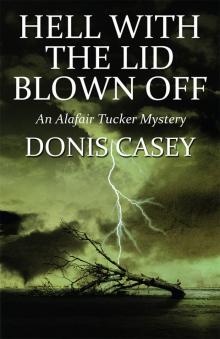 Hell With the Lid Blown Off
Hell With the Lid Blown Off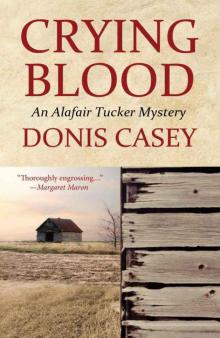 Crying Blood - An Alafair Tucker Mystery
Crying Blood - An Alafair Tucker Mystery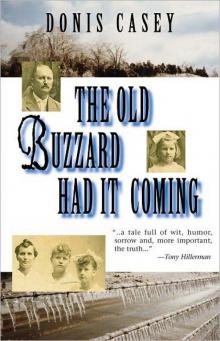 The Old Buzzard Had It Coming: An Alafair Tucker Mystery
The Old Buzzard Had It Coming: An Alafair Tucker Mystery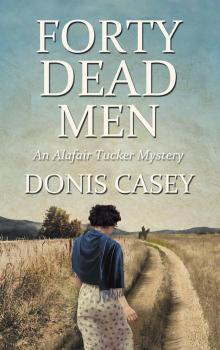 Forty Dead Men
Forty Dead Men All Men Fear Me
All Men Fear Me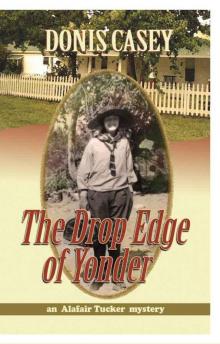 The Drop Edge of Yonder - An Alafair Tucker Mystery
The Drop Edge of Yonder - An Alafair Tucker Mystery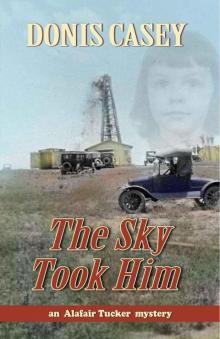 The Sky Took Him - An Alafair Tucker Mystery
The Sky Took Him - An Alafair Tucker Mystery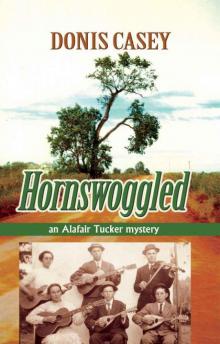 Hornswoggled - An Alafair Tucker Mystery
Hornswoggled - An Alafair Tucker Mystery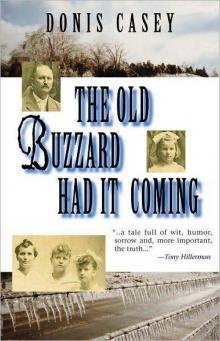 The Old Buzzard Had It Coming
The Old Buzzard Had It Coming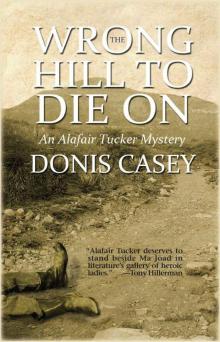 The Wrong Hill to Die On: An Alafair Tucker Mystery #6 (Alafair Tucker Mysteries)
The Wrong Hill to Die On: An Alafair Tucker Mystery #6 (Alafair Tucker Mysteries)